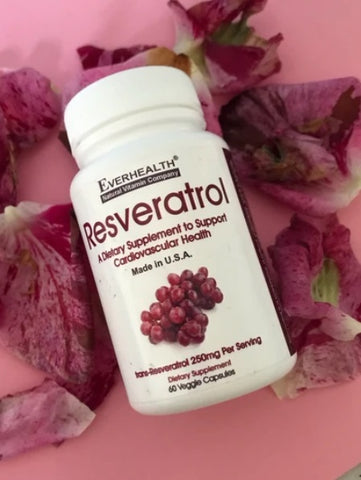What is Resveratrol
Resveratrol is a polyphenolic compound naturally found in peanuts, grapes, red wine, and some berries. Polyphenols, a natural antioxidant, protect cells from naturally occurring substances known as free radicals. Resveratrol is Phytoalexin, an antibiotic produced by plants when they face harmful environments such as fungi and pests, so it helps with many diseases in the body.

Interest in resveratrol skyrocketed in the 1990s when researchers tried to find the reason for the "French Paradox", that is, why French people had a low rate of heart disease despite high-fat diet. They concluded the main cause of the paradox is in resveratrol which is contained in red wine. Since then, various studies have shown that resveratrol suppresses clumps of platelets that can cause blood clots and improves cholesterol profiles.
The resveratrol content varies greatly by the food and it is found that the Polygonum cuspidatum is one of the highly enriched natural sources. Everhealth’s Resveratrol is the natural compound, extracted from this herb used as medical herb for centuries that contains the most resveratrol.
Keep your vitality with Everhealth's Resveratrol that prevents many diseases and prevents aging!

The benefits of resveratrol are as following:
1. Antioxidant Activity
During the metabolism of cells, active oxygen intermediates such as H2O2 and O2- are generated. When they accumulate in cells, they try to maintain a constant level by antioxidants such as glutathione and superoxide dismutase (SOD). If not done properly, oxidative stress in the body increases. When the increased free radical intermediates bind to lipids, proteins, or nucleic acids, and cause modification, they act as toxic substances in the human body, that is, promote the development of cancer or atherosclerosis. For example, LDL cholesterol is normally metabolized and regulated under the tight control of LDL receptors on the cell surface. When excessive oxidative-LDL is produced by increased oxidative stress, macrophages are ingested indefinitely through scavenger receptors to form foam cells. Eventually it leads to the development of atherosclerosis. Resveratrol has been shown to promote the expression of antioxidants and enzymes involved in the antioxidant process to normalize oxidative glutathione reductase or myeloperoxidase activity and to inhibit H2O2 production.

2. Anti-Cancer and cancer prevention effect
The first systematic study on resveratrol's cancer prevention and anticancer activity was published in 1997 by a team at the University of Chicago, USA. They found that resveratrol blocked all three stages of onset, promotion and progression. It is also associated with the strong antioxidant activity of grapes.
Looking at the cancer prevention effects of resveratrol based on this carcinogenic process, resveratrol can alleviate the toxicity of harmful substances acting as a carcinogen and prevent genetic modification and strongly prevent the proliferation of abnormal cells entering the stage of progression.

3. Prevent cardiovascular disease and various adult diseases such as diabetes
Resveratrol has an important effect on lowering serum cholesterol and triglycerides. Resveratrol can dilate blood vessels, inhibit platelet aggregation, improve microcirculation, protect vascular endothelium and lower blood pressure. Because of its antioxidant properties, resveratrol has been shown to be a useful supplement for lowering blood pressure. That's because it increases nitric oxide production. Nitric oxide is a potent vasodilator secreted by vascular endothelial cells that prevents blood clots from forming and inhibits inflammation.
4. Anti-inflammatory and antimicrobial effect as anti-pathogenic substance
Resveratrol and Polygonum Cuspidatum extracts have a strong inhibitory effect against Staphylococcus aureus, Streptococcus and certain viruses.
FDA DISCLAIMER: These statements have not been evaluated by the Food and Drug Administration. The product is not intended to diagnose, treat, or prevent any disease.
